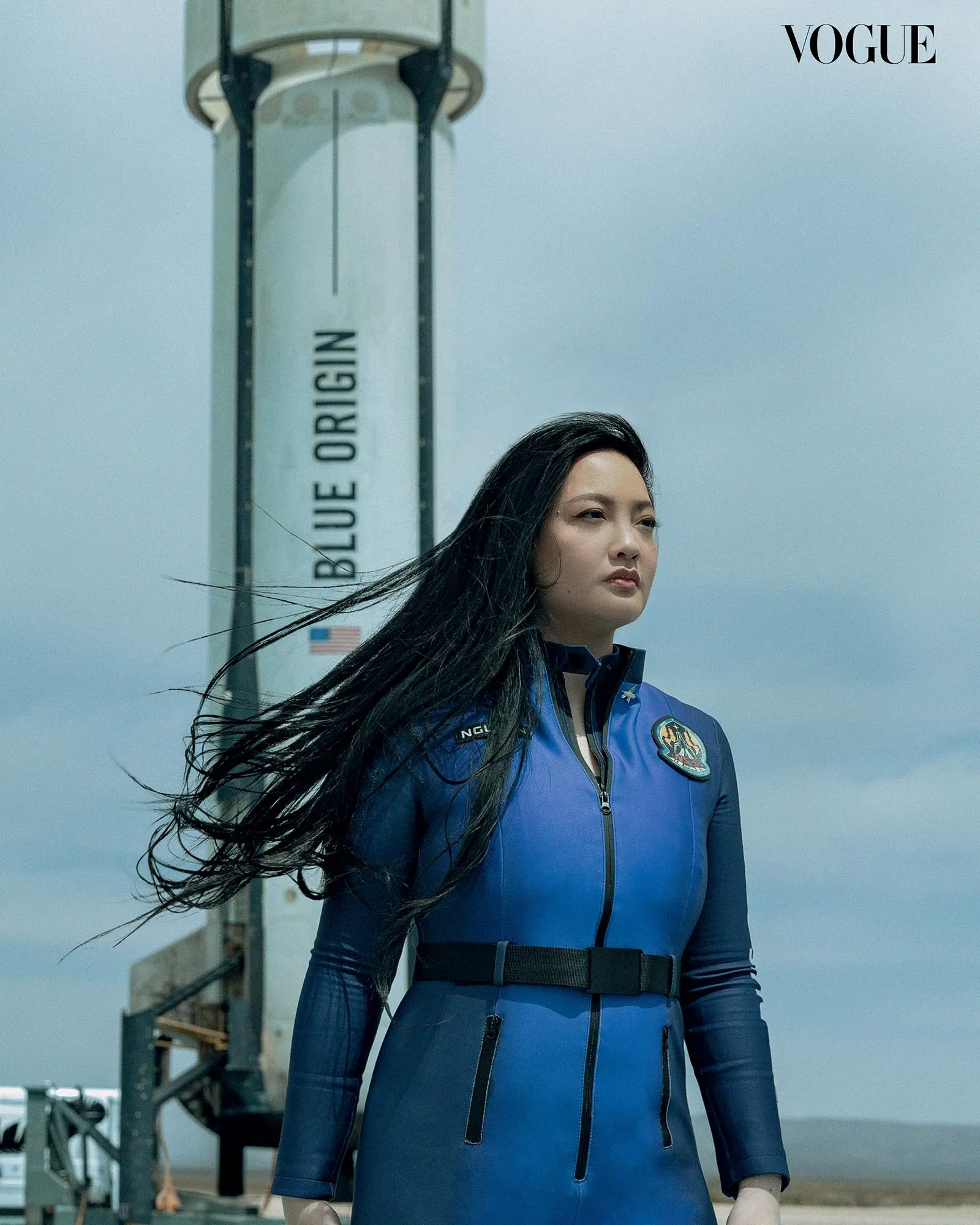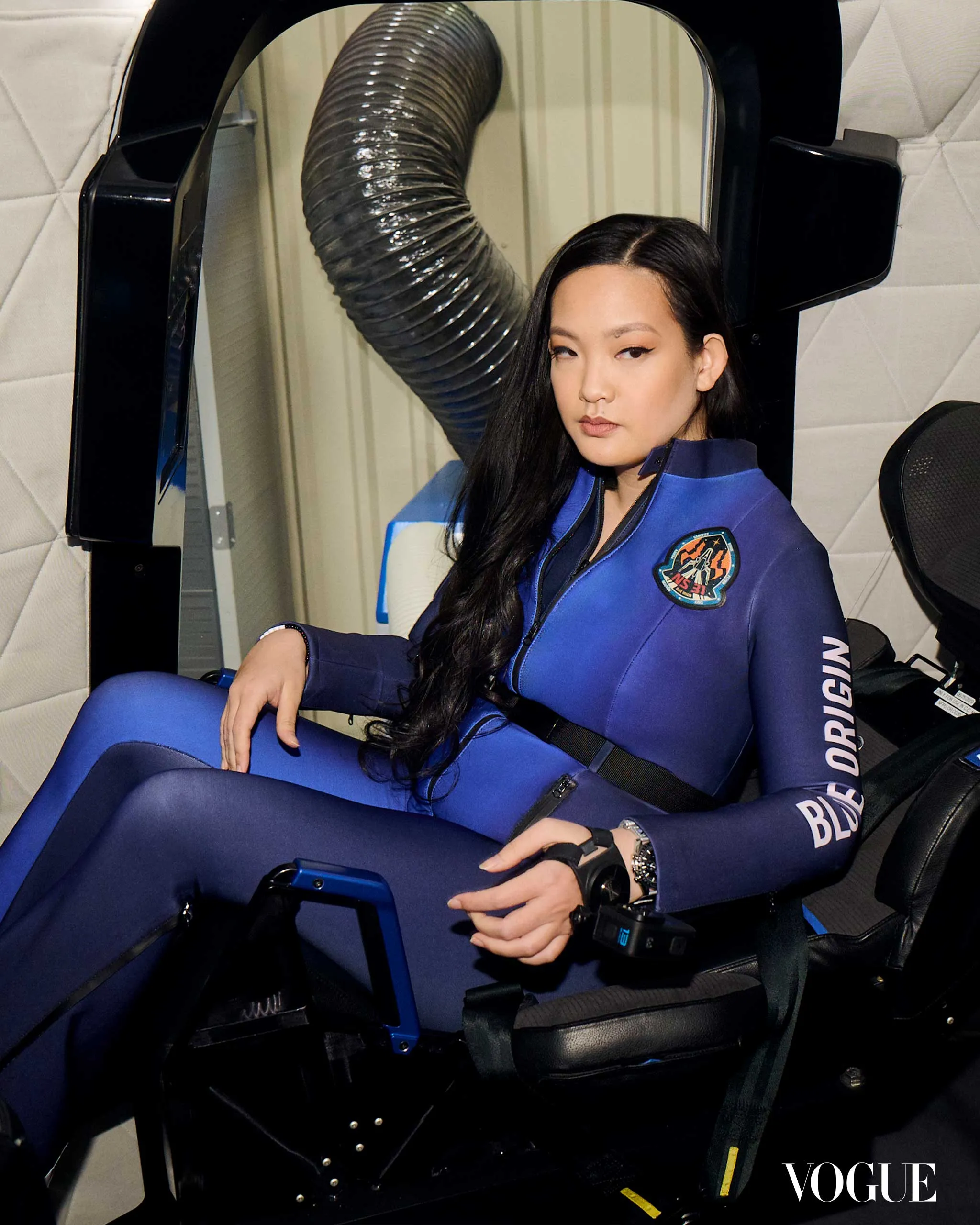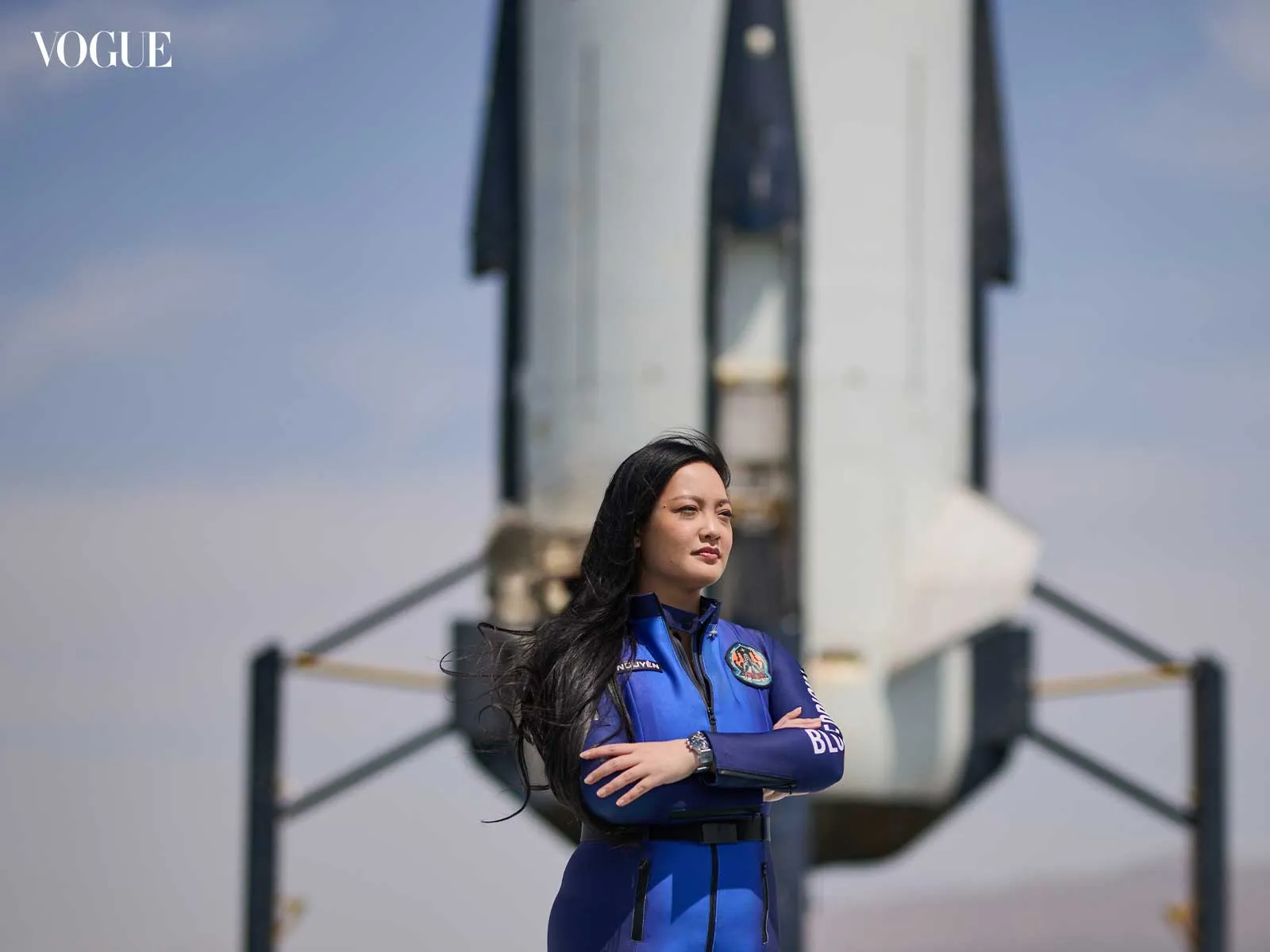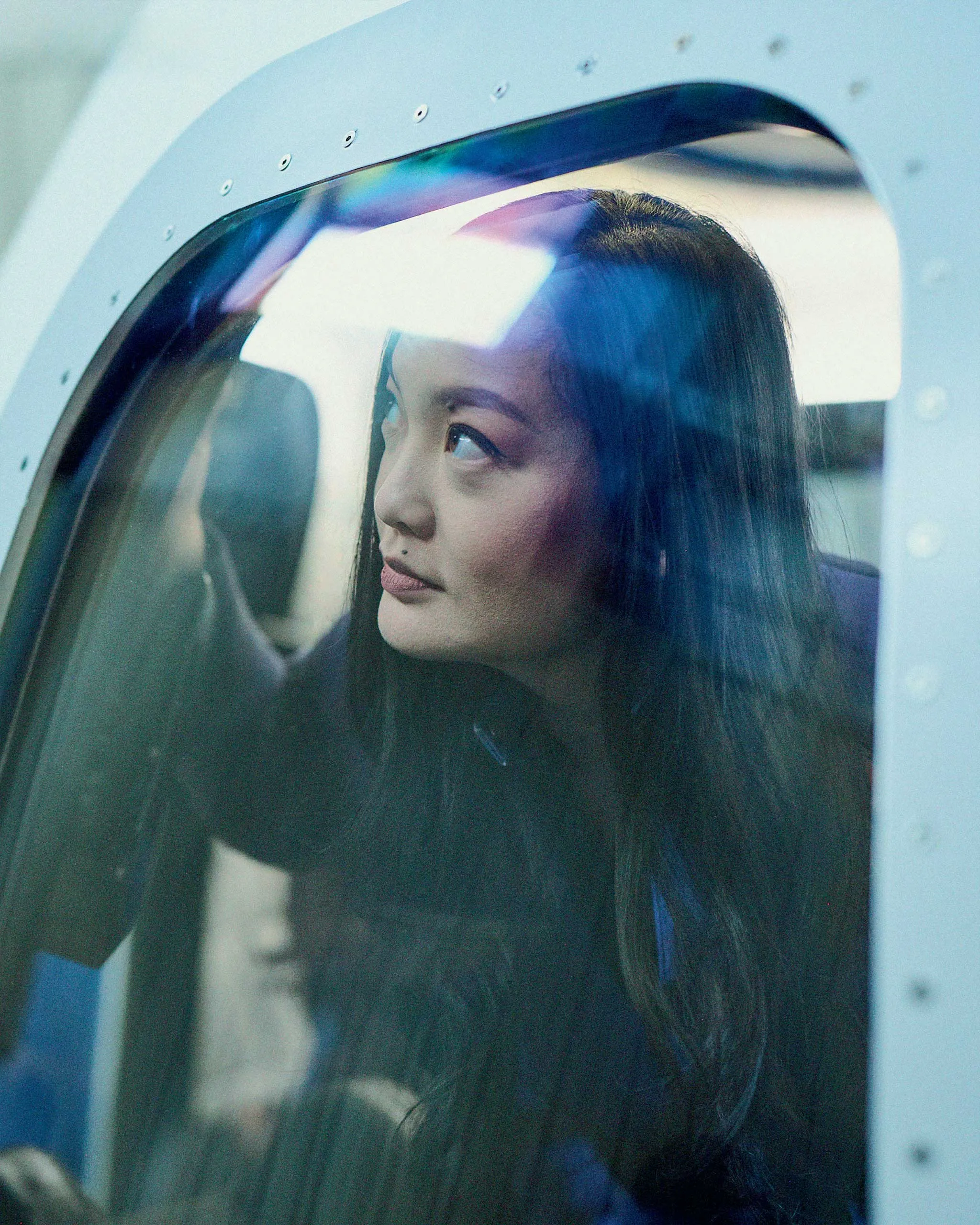Photographed by Duke Winn for the July/August 2025 Issue of Vogue Philippines
Amanda Nguyen’s journey from survivor to the stars is a form of justice.
Amanda Nguyen is calling from space. She certainly sounds over the moon, and who wouldn’t, after achieving a dream she had long held onto and fought for? Physically, she’s in Chicago. “And I’m going to Boston to meet with my payload team at MIT tomorrow,” she says. She’s not referring to the group of women she flew with on the New Shepard, which includes a pop star whose participation was so derided that even Wendy’s dragged her on Twitter, but rather the individuals she worked with to develop the experiments conducted on her flight.
One of Nguyen’s payloads was a piezoelectric ultrasound device created by Dr. Canan Dagdeviren, an instrument that could potentially save up to 12 million lives. Embedded in a bra, the wearable can detect breast cancer earlier than traditional mammograms, with implications both for women on Earth and female astronauts in space, where cancer tumors can grow 10 times faster than they would on Earth.
She also tested the absorption properties of a couple of different materials, one of which was a sanitary pad made of bamboo fiber, courtesy of the Philippine Space Agency. “In the beginning, NASA declined women from becoming astronauts, and one of the reasons they cited was menstruation, but they did not have the data to back that up,” Nguyen says. “The very cursory reason they used was that they did not know how menstrual blood would flow in microgravity, right? And so that was my experiment, seeing how menstrual blood would perform, not only in microgravity, but also in ascent and descent.”
PhilSA’s Director General, Dr. Joel Marciano Jr., tells Vogue Philippines that the agency is honored to have been part of this pioneering endeavor. “Amanda demonstrated the courage of her convictions in dedicating her space journey to inspire and empower others. We thank her for using this opportunity to promote women’s health and rights and to raise awareness of the aspirations of emerging space nations.”
Amanda’s research on women’s health continues her justice work on women’s rights. In 2016, she successfully shepherded the Sexual Assault Survivors’ Bill of Rights Act into law, landmark legislation that gives sexual assault survivors the right, among others, to have their rape kit preserved. In 2013, as a senior at Harvard, Nguyen was raped by a fellow student. On the track to becoming either an astronaut or a CIA agent, Amanda knew she couldn’t afford to press charges at this juncture in her life, especially after being told that the conviction rate for rape cases was a minuscule one percent.

But when she found out that her rape kit, which holds the evidence for future prosecution (the statute of limitations on sexual assault is 15 years), would be destroyed by the state after six months, she had to crawl her way through the gnarled roots of an oppressive legal system that seemed designed to crush all hope in order to save her kit and the possibility of justice. At first, she was doing it for herself, buying time every six months in a situation she described as a “time loop,” but soon she realized this was a fight for all survivors and made the decision to put everything else on hold and bring the issue to the US Congress.
Nguyen details all of this in her book Saving Five: A Memoir of Hope, released just two months before her historic mission as the first Vietnamese and Southeast Asian woman in space. Knowing what she went through and what she accomplished puts into perspective the significance of Amanda’s place on that Blue Origin rocket ship, despite the media uproar over the wastefulness and the generally bad optics of having billionaire space tourists cosplay as astronauts, women or not. The din almost drowned out Amanda’s singular story, but as the noise faded, her work has come to the fore.
“It wouldn’t matter to me if I was flying on a different vehicle, because I’d be doing the same research, and when I fly next, wherever I get assigned, I’ll still be doing that research.” Amanda is vehicle agnostic when she trains for leaving Earth. The space industry is being led by the private sector, so whether it’s Blue Origin or SpaceX, she’ll take what opportunity she can get. “For me, it was completely about the science, and of course, being very intentional about bringing my community with me.” In a short window of time, Amanda carried out her menstruation experiment, gave a speech in Vietnamese, and held up a tattered piece of paper that said, “Never never never give up,” a reminder to herself that she wrote after her assault and which she kept taped to her computer monitor ever since.
The day she launched into space had the same date of the day her rape kit was supposed to be destroyed: April 14, 2014. Maybe the time loop wasn’t broken, after all. It was fixed. “I kept my promise,” Amanda whispered tearfully in a video clip as our blue planet floated outside the window of the capsule. “I kept my promise.”
The launch was attended by the family Nguyen holds dearest to her: a group of female astronauts she calls her Space Sisters, and her aunt, Y Ut, the woman who believed in her dreams. Her Space Sisters include women who have all been to space in some boundary-breaking capacity, like Emily Calandrelli, the 100th woman in space; Katya Echazarreta, the first Mexican-born woman in space; and Dr. Sian Proctor, the first woman commercial astronaut spaceship pilot. Women who truly deserve the credit for inspiring the next generation of girls in STEM.

“What a privilege and joy it has been to grow in this career with them,” says Nguyen. “Somebody said it feels like we’re bridesmaids at each other’s weddings, but instead of a wedding, it’s a space launch.” Her galactic girl gang supports each other not only in space training but in advocacy, and they all walked for her Survivor Fashion Show during New York Fashion Week. The event was conceived as a space for survivors to reclaim the victim-blaming question “What were you wearing?” often asked of women who were assaulted. Amanda’s memoir reveals that these were the first words hurled at her by her father when her parents found out about the assault. The accusation, she writes, left scars that had never quite healed, unlike the physical scars he’d inflicted on her.
Amanda is also a survivor of an abusive childhood, and she admits wrestling with the decision to write about her parents this way. “I originally was not going to write about it at all, and then I read Educated by Tara Westover. In her memoir, she talks about her abusive family and how she taught herself how to get an education, and then eventually ended up at Harvard.” Resonating with Tara’s experience, Amanda reached out to her and asked how she had the courage to write about people who are still alive. “She said to me, ‘Amanda, if I can forgive them for my childhood, then they can forgive me for writing about it.’ And it was so profound to hear her say that, because in that moment, I realized this is our truth, that we lived it, too, and it’s okay to heal.”
Taking this step represented breaking away from the cultural expectations imposed upon Asian children. “Within the community I grew up in, filial piety and keeping things that are unsavory secret is a big part of the culture,” she says. “I want people to know, especially daughters who have this burden of caring for their parents, of being what it means to live up to that role of dutiful obedience. I want them to know that you can love your parents, you can appreciate who they are, but also not have to accept abuse, and that all these complicated things can exist all at once.”
I’m reminded of another Vietnamese American writer, Ocean Vuong, whose novel On Earth We’re Briefly Gorgeous recounts his mother’s physical violence toward him. Written as a letter to his mother (who is illiterate), Vuong acknowledges how his mother’s own trauma was rooted in the tragedy of the Vietnam War. Understanding this allowed him to write from a place of forgiveness and love, not anger or vengeance.
“I think that was the greatest and most difficult part for me, which is exploring the question, ‘how do we love people who’ve hurt us?’” Nguyen continues. “And sometimes these people are our parents, you know? And so the book was really me giving truth to that part, and hopefully having someone out there who can relate to that feel a little bit more brave in seeking the help that they need, to know that actually it’s okay to not take that abuse.” She situates her parents and the choices they made in relation to all that they had lost as refugees barely out of their youth: their identity, their country, their innocence.
“I think stories are empathy machines, and so it was my hope that people who are like me could find a little solace.”
This generational story of loss is not unfamiliar terrain; I tell Amanda that I, too, have family who fled Vietnam as Saigon fell. Aside from my mother, they all live in California, and their names are also Nguyen. “Hey, we’re fam!” she says.
Have your parents read the book? I ask. “They have,” she affirms. “I was very nervous, but they apologized. I want people to know that part, because I think that is the resolution that so many children who have this kind of relationship, that’s what they seek. It took a several-hundred-page story outlining exactly what happened, but they did apologize.” She reflects: “I think stories are empathy machines, and so it was my hope that people who are like me could find a little solace.”
Saving Five is structured around two narratives: one is the story of Amanda as a 30-year-old, reliving the time from her assault to her awakening as a social justice activist and drafter of laws. The other, a more surreal journey where Amanda at different ages (five, 15, 22, and 30) join forces on a gamified quest to save the five-year-old, who has been infected with a poison that will slowly kill her if they don’t make it to the final stage in time. The levels are patterned after the stages of grief, each guarded by a realm keeper who has a gift to be exchanged for a memory.
Amanda describes it as a roadmap for others to use to process their own grief. “When we are brave enough to go through those painful moments, each stage of grief has a gift to give us and ultimately help us heal. Denial gives us a compass to navigate. Anger fuels us. Bargaining gives us a way to move forward. Sadness gives us humanity, and ultimately, Acceptance gives us grief, and we grieve to the depth of our love,” she says, sharing that the memories she attached to each were pivotal, transformational moments in her life that “alchemized the momentum” of her life story to the next stage.
The first childhood memory she offers gives us a glimpse of the dark expanse she would escape to while running away when her father would get into a violent episode. She would look up at the night sky as she hid out at the park or a neighboring ranch. “The stars were my first protectors.” Even as Amanda pursued her astral calling, she would never be truly free from the violence that haunted her until she crossed to the other side of fear. She would not be given the gift of flight until she had changed the conditions on the ground, conditions that kept survivors like her tethered, held down.

In September 2022, the United Nations General Assembly unanimously adopted the resolution granting access to justice, reparations, and assistance for survivors of sexual assault and gender-based violence. It was the first time the UN had passed a standalone resolution recognizing rape in peacetime. Nguyen’s organization Rise, which she started in 2014, was instrumental in bringing this to fruition. But the work is far from over; the next barrier to be breached is universal jurisdiction. “Universal jurisdiction refers to the idea that some crimes are so grave that they cross borders and can be prosecuted by different countries,” she explains. “We’re fighting for sexual violence to be included in that definition.”
For someone who has looked down on Earth from beyond the Kármán Line, justice isn’t truly just unless it’s given to all women, everywhere. During the debriefing session after the launch, somebody asked Amanda about experiencing the Overview Effect. “I know that for so many astronauts, when they see Earth for the first time, it is transformative, and they come back with a new sense of humanitarian work,” she says. “For me, it wasn’t a new sense. It was a renewed sense that I will continue to do this work.” From the Survivor Fashion Show to the most talked about 11 minutes in space, Amanda uses these moments that capture the world’s attention to get in front of heads of state and fight for women’s rights.
Another postcard from the edge of space: Amanda filming herself saying, in Vietnamese, Hello Vietnam! I’m flying for young Vietnamese girls to see themselves in the stars. While I may be the first, I won’t be the last, as her long hair swirls around in microgravity. Representing Vietnam on this flight was intentional and significant, especially as it happened on the same month as the 50th anniversary of the fall of Saigon. Amanda also partnered with the Vietnam National Space Center and plant pathologists from the University of Wisconsin-Madison to operate an experiment with brassica seeds, which have a history of being studied in space for their application as a fast-growing food source, addressing food insecurity on land and astronaut sustainability in space. Science, Nguyen believes, can also be used as a tool for peace and reconciliation.
I ask Amanda what she remembers the most about the suborbital flight, and what surprised her was realizing that she felt the opposite of impostor syndrome. “When we were pulling over 5 Gs in descent I remember thinking, wow, my training paid off. I actually love doing this stuff. I’m meant to do this,” she tells me.
“It was a return to the joy of that girl, who I was before I was raped. I not only kept my promise to her, but I found again her joy, and that part of her became alive again in me.”
By AUDREY CARPIO. Photographs by DUKE WINN. Edited by Joyce Oreña. Beauty Writer: Bianca Custodio. Makeup: Tiphereth Danger. Hair: Fania Dambreville. Talent Manager: Cameron Marsh. Assistant Photographer: Hoang Nguyen

